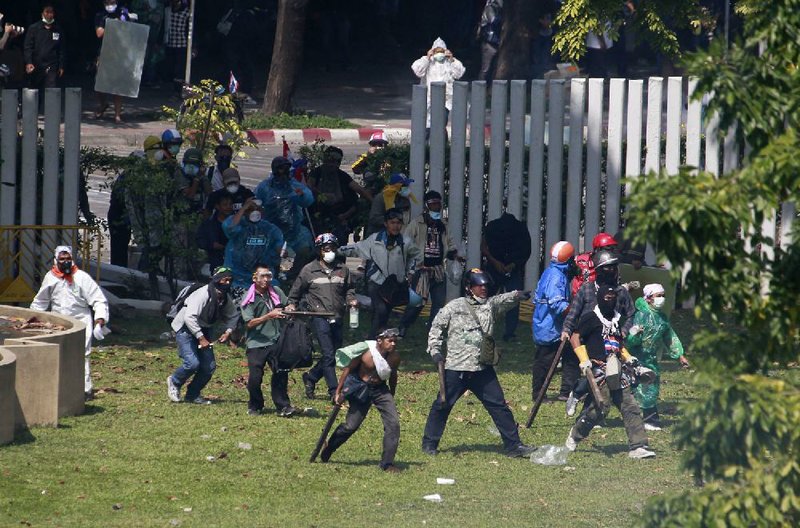BANGKOK - After chaotic clashes between the police and anti-government protesters Thursday in Bangkok that left one police officer dead and dozens of people injured on both sides, the Election Commission of Thailand urged the postponement of national elections set for Feb. 2, further clouding the way forward for Thailand after a month of debilitating street protests.
A postponement would be a victory for the protesters, who oppose the elections on the grounds that they will probably return to power the government of Prime Minister Yingluck Shinawatra, whose party is popular in the northern half of the country but despised by many southerners and members of the Thai elite.
Charupong Ruangsuwan, the head of the governing party, who is also interior minister in the outgoing government, reacted angrily to the proposed postponement.
“I insist that the Election Commission has to comply with the law,” he said in televised remarks. “The Election Commission has a duty to carry out the whole process.”
Over the past month, protesters have raided government ministries, cut power to government offices and police stations, and marched through Bangkok in huge numbers. On Thursday, they attempted to raid the Bangkok stadium where political parties were completing pre-election formalities.
Their attempts to seize the stadium were thwarted by riot police officers. One officer was killed by gunfire and 24 others were wounded, including 10 in critical condition, police said. In addition, several dozen protesters were injured by tear gas and rubber bullets.
Election Commission officials were evacuated from the site by helicopter.
Sunai Phasuk, a senior researcher in Thailand at Human Rights Watch, wrote on Twitter that democracy in Thailand had been “hijacked by violence and thuggery.”
“Shame!” he wrote.
In comments to reporters Thursday, the head of the Election Commission, Somchai Srisuthiyakorn, said he had urged the government to postpone elections. But he also said the elections would not take place Feb. 2 unless protesters reached an accommodation with the government.
“If there’s no understanding or agreement in our society, the election on Feb. 2 is not going to happen,” he said.
Thailand is politically divided between its north and south and between allies and detractors of the Shinawatra clan, the country’s most influential political family.
The political crisis appears to have contributed to a drop in the baht, the Thai currency, and has been blamed for a decline in the stock market. Although the protests have on most days been confined to a limited area of Bangkok, hoteliers say the crisis also has caused cancellations during what is traditionally Thailand’s peak tourism season.
The protesters are closely allied with Thailand’s Democrat Party, the oldest political party in the country, which has struggled over the past decade to compete with the popularity of Thaksin Shinawatra, a former prime minister who is Yingluck’s older brother.
The Democrats announced last weekend that they would boycott the Feb. 2 elections. Every other major party in the country has said it will participate.
The crisis has confounded many observers because the protesters - who on some days have numbered in the hundreds of thousands in Bangkok - are marching against elections.
Chuwit Kamolvisit, the leader of a small opposition party, Rak Prathetthai, decried what he called a “bloody election.”
“I don’t know why elections, which are accepted as international standards of democratic systems, are heavily opposed like this,” he said in a Facebook posting Thursday. The government and the protesters differ over whether they want changes before or after elections, he said. But “at the end of the day it will come down to elections.”
Ichal Supriadi, the executive director of the AsianNetwork for Free Elections, an organization that observes and monitors elections, said people in other countries had opposed elections, sometimes on security grounds, but this was the first time he had witnessed such a mass movement against elections.
Ichal issued a statement lauding the “unique role that elections hold in a democracy” and urging protesters to allow the voting to proceed.
“All efforts and plans to forcibly impede the election process should cease,” the organization, known as Anfrel, said in the statement.
Ichal, who is from Indonesia, said Thailand had “shown a degree of professionalism” in conducting elections in the past.
The governing party, Pheu Thai, won a landslide in the last election in 2011 with a turnout of 75 percent. The Democrats conceded defeat.
“We are not taking sides but we believe that elections are the only mechanism to count every individual in Thailand,” Ichal said in an interview.
Information for this article was contributed by Poypiti Amatatham of The New York Times.
Front Section, Pages 2 on 12/27/2013

